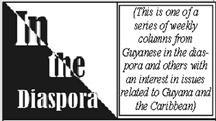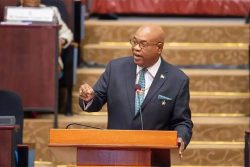Yarimar Bonilla is a founder of the Puerto Rico Syllabus project and co-editor of Aftershocks of Disaster: Puerto Rico Before and After the Storm. She is Professor of Puerto Rican Studies and Anthropology at Hunter College and the Graduate Center of the City University of New York, and a 2018-19 Carnegie Fellow.
Editor’s Note: This article was originally carried in The Nation on July 22, 2019. A version of this article was originally published in Spanish in El Nuevo Día. It ran two days before Governor Ricardo Rosselló would finally bow to overwhelming public pressure and massive demonstrations, becoming the first governor in the history of Puerto Rico to resign. In an op ed carried in the Boston Globe on July 26, Rita Indiana observed that Puerto Rico had given “the world a master class on mobilization.” But the struggle continues. On August 2, Wanda Vázquez, secretary of justice, will assume the governorship. As Indiana notes, “according to documents published on the blog of journalist Sandra Rodríguez Cotto, [Vázquez] may have coauthored and covered up various corruption schemes. The hashtag #WandaRenuncia [#WandaResign] is now trending.”
It seems appropriate for Puerto Rico’s self-proclaimed “millennial governor” to be brought down by his own text messages—a modern spin on Richard Nixon’s White House tapes. On July 13, just days after an FBI corruption probe rocked Governor Ricardo Rosselló’s administration and resulted in the arrests of two top officials, the island’s Center for Investigative Journalism released 889 pages of leaked chat logs between Rosselló and his inner circle—many of them crude and offensive. The governor seemed to assume that his texts and their misogynistic, homophobic, and fatphobic comments would never reach the public, that his party’s loyalists would never turn their backs on him, and that the Puerto Rican people were too ideologically fragmented to rally around a common cause.
Yet for more than a week, in what are some of the US territory’s largest-ever protests, tens of thousands of Puerto Ricans have come together to protest outside the governor’s mansion in San Juan, demanding Rosselló’s immediate resignation. Despite announcing on Sunday that he would no longer serve as president of the conservative New Progressive Party and that he would not seek reelection next year—an empty concession given his unpopularity—Rosselló refuses to resign. But as administration officials continue to exit in disgrace, his government is crumbling from under him.
Despite multiple scandals, Rosselló appeared to believe he would emerge unscathed. Soon after the arrests of two of his cabinet members, he declared himself to be a “resilient” governor, a remark offensive to Puerto Ricans who, for the past few years, have been forced to exhibit a nearly unbearable resilience. Since Hurricane Maria battered the island in 2017, people across the island have been forced to live without electricity and running water and to navigate dark streets without traffic signals, while they attend school in makeshift trailers, bury dead relatives in mass graves, and wait months to receive medical treatment because so many doctors have fled the island’s economic crisis.
The government and its spin doctors have grown fond of celebrating the population’s resilience. They applaud the strength of those still living under blue tarps and who have been forced to rebuild their own homes brick by brick after being denied Federal Emergency Management Agency (FEMA) assistance. They romanticize a recovery effort that has been carried out through sheer force of will, spearheaded by people who have seen no trace of the thousands of dollars ostensibly donated from telethons and charity drives and who have yet to benefit from the government-affiliated nonprofits such as United for Puerto Rico, Your Home Reborn, or any of the other countless entities named with meaningless slogans.
In this age of resilience, many Puerto Ricans have turned to chat groups and virtual conversations not all that different from the governor’s. They’ve often laughed to avoid crying, gossiped about beauty pageants and other banalities, thrown around curse words, and circulated memes to—as Rosselló claims he did—”relieve stress.”
The governor’s chat messages, however, contained not only jokes but threats of state violence and political repression. In one exchange, Rosselló suggested that the wife of local pro-independence politician Juan Dalmau, who had been a vocal critic of his administration, be removed from her government post and replaced with a pro-statehood employee. In another, Christian Sobrino, the governor’s chief financial officer and representative on the island’s fiscal control board, complained about “crazy” videos addressing government corruption that a progressive legislator, Manuel Natal, was publishing on social media. In response, Rosselló suggested that he should send the police Natal’s way (Sobrino resigned from his post soon after the texts were leaked).
The chats also included a conversation on how to interfere with the work of a federally appointed monitor for the police department and repeated discussion of plots to destabilize public institutions, such as the University of Puerto Rico (which the government has gutted through budget cuts and threatened to close), the government radio station WIPR (which they seek to privatize), the Institute for Statistics (which produces reports that often undermine the government’s neoliberal agenda), and the Electric Power Authority (a longtime target for privatization and profiteering).
There were a few moments when something akin to a discussion of public policy broke through the narcissism, insults, and mockery. But even those conversations reveal a deep ignorance of the reality that everyday Puerto Ricans face. In one message, Sobrino asks: “Is Your Home Reborn really that bad? Serious question.” This, despite the fact that the government program, which was tasked with rebuilding homes, has racked up nearly 4,000 formal complaints while lining the pockets of US contractors. When talking about public ferry service to the islands of Vieques and Culebra, one government consultant commented on the dilapidated state of “basic things like bathrooms,” to which Sobrino responded that anyone taking the ferry “on purpose” must be crazy. Many who live in Vieques regularly take the ferry to commute to work or school, or to receive medical treatment—especially important here given that the presence of a US naval bombing site resulted in disproportionate rates of cancer and cardiovascular diseases.
In the hundreds of pages of conversation, the closest thing to a call to public service appears when former Treasury Secretary Raul Maldonado suggests that maybe they should stop joking and instead focus on securing “the legacy” of Rosselló’s administration. In the days since the messages were leaked, some have argued that an emphasis on spinning public image is to be expected given that many chat members were media consultants. But the leaked messages also revealed a concerted effort at misinformation through the use of paid social-media trolls, videos silvestres (videos that appear independent but are actually government produced), repeated efforts to influence journalists and control media interviews, and constant attempts at silencing government critics. The messages make it clear that there is no desire to improve Puerto Rico’s situation or the lives of its residents.
In the wake of these revelations—and the unmistakable anger they have generated—the governor should perhaps stop betting on Puerto Ricans’ resilience. For nearly two years now, Puerto Ricans have been repeatedly called upon to tighten their belts, accept fewer services, and pay higher taxes and utility costs while managing loss and trauma. But now, as protesters continue to storm San Juan and pressure continues to mount on Rosselló to resign, the Puerto Rican people are giving this narrative of resilience a different meaning. As the island bands together to demand the ouster of their governor and forge better collective possibilities, an often-touted phrase in the wake of Hurricane Maria takes on new significance: Puerto Rico Se Levanta—”Puerto Rico Rises Up.”









